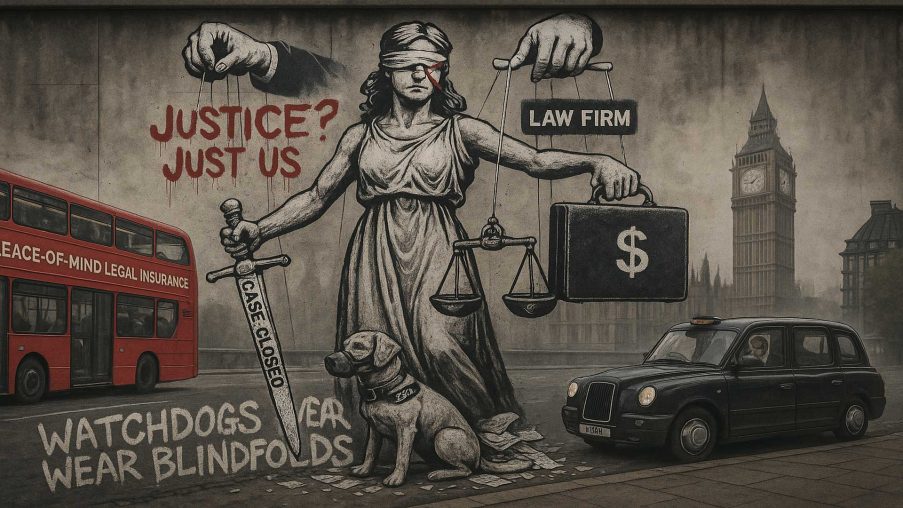Ms C, a blind client, endured over five years of disability discrimination by her employer, the Ministry of Justice (MOJ), resulting in significant mental health challenges. Seeking legal support for a matter that was both urgent and emotionally complex, she turned to her legal expenses insurer after her employer breached a previous compromise agreement.
What followed was a cascade of procedural failures, culminating in a regulatory system that refused to act—even when the evidence was clear and compelling.
Ms C’s case was prematurely closed by panel solicitors after two flawed assessments. From the outset, concerns were raised about conflicts of interest between the solicitors, the insurer, and her employer. The solicitors prejudged her case as weak before any proper assessment had taken place, undermining her access to justice.
When the case was returned to her insurer, Arc Legal, the company echoed the solicitors’ view and refused to fund a reassessment. Ms C was told she would need to obtain her own independent legal opinion before the insurer would reconsider. Only after persistent challenge did the insurer agree to instruct a barrister, who concluded that her case had a greater than 51% chance of success—directly contradicting the earlier dismissals.
A formal complaint was submitted to the solicitors, but it was dismissed by the firm’s compliance director, who was also a solicitor. That same individual later handled Ms C’s Subject Access Request (DSAR), which was provided in an inaccessible format despite her known disability. This dual role in both the conduct and the complaint handling raised serious concerns about impartiality and internal containment.
Further complicating matters, the solicitor in question had documented links to both the insurer and the Ministry of Justice. These connections cast doubt on the independence of the process—especially as the insurer attempted to reject the case outright after it was returned to the solicitors, despite previously accepting liability. This reversal appeared to follow internal communications that Ms C was never permitted to see.
The Solicitors Regulation Authority (SRA) was presented with a detailed complaint, supported by a positive barrister’s opinion, a damning grievance finding, and clear evidence of accessibility breaches. Yet the SRA refused to investigate. Its responses were templated, dismissive, and failed to engage with the substance of the allegations.
Shortly after the complaint was submitted, whistleblower-style feedback on the SRA’s Trustpilot page—describing similar regulatory failures—was quietly removed. The review was later reinstated following the submission of Ms C’s complaint, suggesting either internal reconsideration or external pressure. The timing was not coincidental; it mirrored a similar deletion by the law firm involved, reinforcing a pattern of reputational containment.
The subsequent discovery of SRA Under Fire, a published exposé detailing widespread allegations of regulatory capture, whistleblower retaliation, and failure to act on serious misconduct, made clear that Ms C’s experience was not an isolated incident but part of a documented pattern.
Ms C’s advocate, Mr. E, has since escalated the matter to disability rights organisations, oversight bodies, and Members of Parliament. But the question remains: how many vulnerable clients are being quietly dismissed, their evidence ignored, and their rights eroded—not because their cases lack merit, but because the system lacks accountability?
Ms C’s story is not just about one client. It is about whether regulators serve the public, or the profession.
Disclaimer
This article is based on real events and documents but has been prepared for the purpose of public interest commentary, advocacy, and awareness. Certain names and identifying details have been changed to protect the privacy of individuals involved. The information presented reflects the author’s understanding of the facts at the time of writing and should not be relied upon as legal advice. Readers are encouraged to seek independent legal or professional advice in relation to any similar circumstances.


Thank you for posting the case of a blind client. I am suffering the same abuse and obstruction of justice. I do hope this lady’s case was finally settled as this is a horrific account of networking abuse of process and obstruction of justice.
I’m really glad this has been written. As a visually-impaired person who is also taking action against my employer and the legal system, I know how deeply these issues run. Far too many blind and partially sighted people have been disadvantaged by a system that should protect them but instead puts up barriers at every stage.
What’s most troubling is that the very places people turn to for justice can be just as flawed, biased, and defensive as the organisations they’re challenging. The justice system is not exempt from scrutiny it is a public body, funded by the public, and it must be held to the same standards of fairness, transparency, and accountability that it demands of everyone else.
No one should be denied fairness or access to justice because of their disability. It’s encouraging to see someone shining a light on these failures, and I’m glad that Legal Lens have been prepared to look deeper into what appears to be a serious miscarriage of justice. Their willingness to challenge institutional bias is both courageous and long overdue.